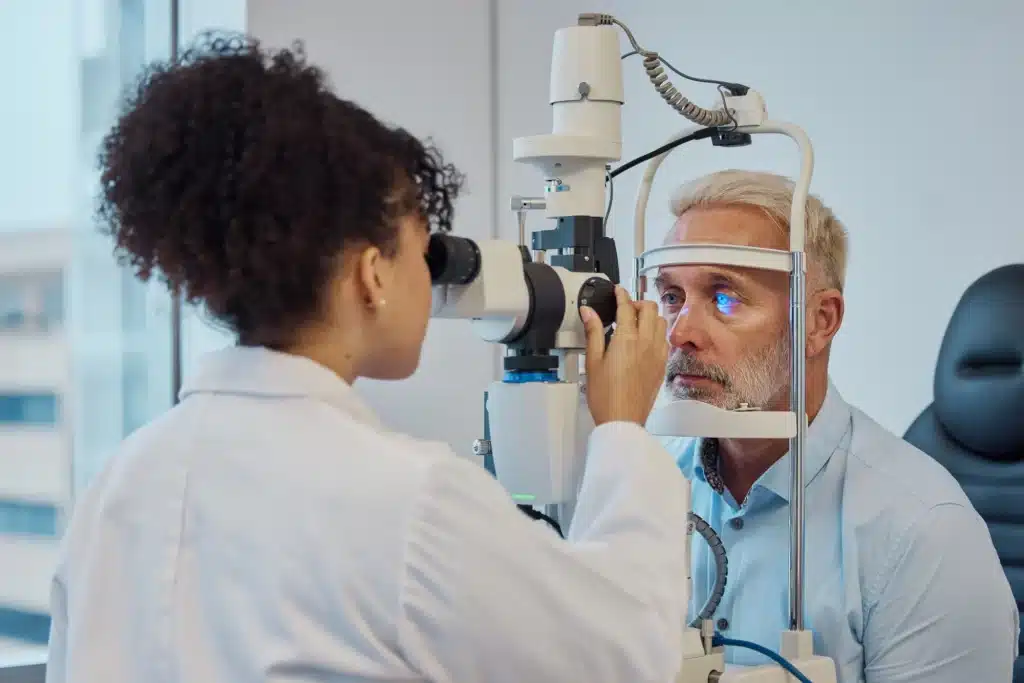Medically Reviewed by: Paul J. Stewart M.D.
What Causes Macular Degeneration?
What causes macular degeneration? Though the reason for the onset of macular degeneration is unknown, science has come a long way in understanding what is actually causing the symptoms of the disease. Here’s what science currently tells us about what causes macular degeneration, as well as macular degeneration warning signs to watch out for and more.
The current science behind what causes macular degeneration
Age-related macular degeneration (AMD) is an eye disease that primarily affects the central portion of the retina, known as the macula.
In its dry (non-neovascular) form –– the most common form –– little bits of fat and protein called drusen begin to collect underneath your retina. Individual drusen are typically harmless, but when they accumulate en masse behind your retina, they start to cut off the oxygen supply to your eye. In the wet (neovascular) form of macular degeneration, abnormal blood vessels (thought to form as an effort to rid your eye of drusen) also begin to form underneath the retina. Unfortunately, these blood vessels increase the risk of fluid or blood leaking into the retina.
Dry macular degeneration is considered less serious and causes more minimal vision loss than wet macular degeneration. Please see our article for more information regarding wet vs. dry macular degeneration.
FAQ: How long does it take to lose vision with macular degeneration?
On average, it takes approximately 10 years from diagnosis to become legally blind. In very severe cases, eyesight can be lost in as short as a few days. If you are near the age of 70, try to see your eye doctor regularly.
Macular degeneration risk factors
While what causes these drusen to collect (and thus what causes macular degeneration onset) is still unknown, several risk factors for AMD have been identified.
-
- Age: Age is by far the biggest determining risk factor for AMD. It’s very common for individuals over the age of 70 to be diagnosed with some degree of macular degeneration.
- Gender: Women are currently considered to be more likely to get AMD than men, but this may be because most women live longer than men. About ⅔ of all patients with AMD are women.
- Smoking: People who smoke have been found more likely to have AMD. It is thought that this is due to the fact that smoking reduces the amount of oxygen that reaches your eyes.
- High blood pressure: Like smoking, high blood pressure can also reduce the amount of oxygen that reaches your eyes.
Other potential risk factors include obesity, certain medications, and poor diet, although the research on linking these factors to AMD is still inconclusive.
Signs of macular degeneration to watch out for
There are a few symptoms to note if you suspect you may have macular degeneration. Here are some typical examples of the common signs of macular degeneration to look out for:
- Your vision is gradually becoming more blurry
- Your eyes have difficulty adjusting to different levels of light
- You may have issues with color, depth, and texture perception
- Your vision becomes spotty
If any of these signs of macular degeneration feel familiar, check out our article on how to self-test for macular degeneration using the macular degeneration amsler grid.
Early detection is key to the successful treatment of macular degeneration. If macular degeneration is not detected soon enough, your vision can become more wavy and distorted at a quicker rate.
Can you reverse macular degeneration?
There currently are no macular degeneration treatment options that will cure you of AMD. However, if you catch the early signs, you may be able to slow the disease down. The best way to practice macular degeneration prevention is to make permanent lifestyle changes to slow the disease:
- Schedule regular eye exams
- Quit smoking
- Incorporate vitamins A, E, and C
- Improve your diet and exercise
- Protect your eyes from sunlight exposure
For a deeper understanding of AMD prevention, read our article: Macular Degeneration Prevention Tips. Treatment options for AMD include laser procedures, eye injections, and certain vitamins. For more information, speak with an ophthalmologist at Eye Center of Texas.
Don’t wait. Speak with a macular degeneration specialist at Eye Center of Texas today
Think you may be showing signs of macular degeneration? Have additional questions regarding what causes macular degeneration? A retina specialist in Houston from Eye Center of Texas can help answer your questions and work with you on how to maintain your vision. Our experience detecting and treating macular degeneration allows us to promptly answer your questions and take preventative measures.
Call 713-797-1010 or request an appointment online today.
More Helpful Articles by Eye Center of Texas:
Related Articles
Financing Options Available
Apply today to find a financing option that meets your needs.
Our Locations
Houston/Bellaire
6565 W. Loop S., Suite 650Bellaire, TX 77401
Medical Office:
713-797-1010
Medical Fax:
713-357-7276
LASIK/Near Vision:
Office: 713-395-1515
Fax: 713-357-7278
Pasadena
4415 Crenshaw RoadPasadena, TX 77504
Medical Office:
281-977-8800
Medical Fax:
281-977-8877
Sugar Land
15200 S.W. Freeway, Suite 130Sugar Land, TX 77478
Medical Office:
281-277-1010
Medical Fax:
281-277-4504
Clear Lake
455 E. Medical Center Blvd., Suite 110Webster, TX 77598
Medical Office:
281-332-1397
Medical Fax:
281-282-9152
Katy
Greenhouse Medical Plaza2051 Greenhouse Road, Suite 110
Houston, TX 77084
Medical Office:
346-547-7070
Medical Fax:
281-214-2971
The Woodlands/Conroe
100 Medical Center Blvd., Suite 118Conroe, TX 77304
Medical Office:
936-647-1610
Medical Fax:
936-647-1620


